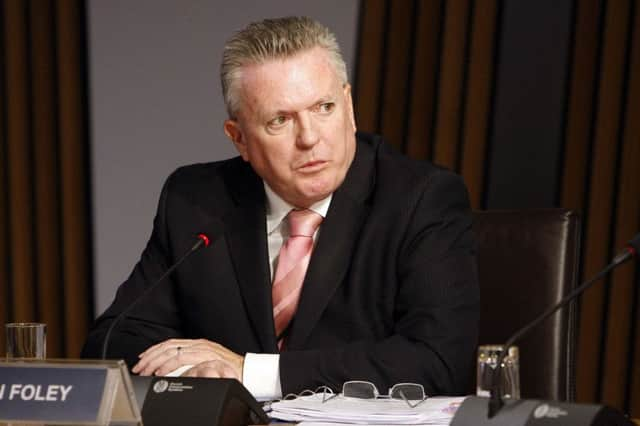Police watchdog accused of '˜gross misuse' of public money over redundancy deals


Four senior figures at the Scottish Police Authority, the body responsible for oversight of Police Scotland, received a total of more than £350,000 they were not entitled to, the tribunal was told.
Amy McDonald, a former director of financial accountability at the organisation, said there was “significant wrongdoing” and “gross misuse of public resources” at the authority, which helps set the single force’s annual £1bn budget.
Advertisement
Hide AdAdvertisement
Hide AdAmong a range of redundancy packages she claimed contravened SPA policy, Ms McDonald told how one executive left the authority in May 2016 pending prosecution for a domestic abuse offence.
The individual, referred to as GH, received a redundancy payment of £145,000 and a further payment of £20,000 in lieu of notice, Ms McDonald claimed, when instead they could have been dismissed on grounds of “gross misconduct.”
She added that the payment was signed off by John Foley, the then SPA chief executive, despite the fact a member of the authority’s senior management group voiced misgivings.
Ms McDonald, 44, said the circumstances surrounding the executive’s arrest in April that year were “common knowledge” within the SPA, including to Mr Foley, but he went ahead and approved the deal.
“He was advised by the director of governance within SPA, ‘Are you sure you want to sign that payment off?’,” Ms McDonald said.
“That person shouldn’t have received any money. They could have been dismissed from the organisation at no cost to the taxpayer.”
Ms McDonald, who sat on the SPA’s finance and audit committees, claims she was sidelined from meetings after alerting senior SPA figures to the potential misuse of public funds,
In total, the payments she claims that should not have been made account for £359,000 of taxpayers’ money.
Advertisement
Hide AdAdvertisement
Hide AdA court order obtained by the SPA prevents the names of the senior figures who received the payments from being revealed in connection with the proceedings.
However, The Scotsman understands that the senior figure referred to as GH is a woman.
At the first day of the tribunal in Glasgow before employment judge Susan Walker, Ms McDonald also said that in December 2016, she contacted Mr Foley and Andrew Flanagan, the then chair of the SPA, after discovering a redundancy payment of £76,900 was due to be paid to a senior figure.
Ms McDonald became “suspicious” after learning the individual had sent bottles of champagne and gift bags to employees in the finance department.
Only two months before, the SPA’s deputy chief officer announced at a finance meeting that the individual in question, referred to as IJ, had tendered their resignation.
Ms McDonald alleged that James Gray, chief finance officer at Police Scotland, had “asked the individual to withdraw their resignation, and they would put together a case of redundancy payment.”
After growing “increasingly concerned” Ms McDonald flagged up the issue to her superiors, explaining: “I knew the employee had resigned, so I couldn’t understand why they would be in receipt of a redundancy payment.”
However, she said neither Mr Foley nor Mr Flanagan replied to her email. Ms McDonald said she spoke to Mr Foley about the case, but that the exchange was brief.
Advertisement
Hide AdAdvertisement
Hide Ad“I asked him if he read the email,” she recalled. “‘No,’ he said. ‘Is it okay?’. ‘No, no, it isn’t’, I said, and that was the end of the conversation.”
Responding to questions from advocate David Hay, Ms McDonald also told the tribunal about a payment of £47,000 made to a senior individual, referred to as EF, who had worked for the authority for less than two years. Under its voluntary redundancy and early retirement scheme, she explained, the individual should not have been entitled to any such payment on account of their short service.
In another instance, she said a senior executive, known as CD, received a redundancy package of £108,000, around £70,000 more than they should have received, made up of a £45,000 “uplift” in redundancy payment and a £25,000 payment in lieu of notice.
“When you receive pay in lieu of notice, you should only receive that in exceptional circumstances,” Ms McDonald said. “I couldn’t see any in this case.”
Both Mr Foley and Mr Flanagan left the SPA last year amid criticism of the watchdog’s transparency, governance and performance under their leadership. Mr Foley, who earned up to £115,000 a year, received around £100,000 after taking up early retirement.
In December, Scotland’s auditor general said an Audit Scotland report had identified “a number of instances of poor governance and poor use of public money” at the SPA.
Audit Scotland said relocation expenses of £67,000 paid to Deputy Chief Constable Rose Fitzpatrick had not been properly disclosed in the accounts. The same officer’s £53,000 personal tax liability for 2016/17 was also paid by the SPA.
The report also reserved criticism for the expenditure of £344,000 on three temporary posts.
Advertisement
Hide AdAdvertisement
Hide AdMs McDonald, a qualified chartered accountant who previously worked for organisations including PwC, Ernst and Young, and Shell, now works as a senior executive in the SPA’s forensic services division.
She told the tribunal she was compelled to raise the potential misuse of funds because SPA was fundamentally a “governance body” supposed to hold Police Scotland to account.
It emerged earlier this month that justice secretary Michael Matheson had known about Ms McDonald’s allegations since the summer.
She told the tribunal: “I thought they were worthy of investigation. They received money they were not entitled to and one individual received money they were not entitled do because they had committed a criminal offence.”
She later added: “I joined the public sector deliberately because I wanted to make a difference. I didn’t want to work with people who were rich and make them richer.”
The tribunal continues.